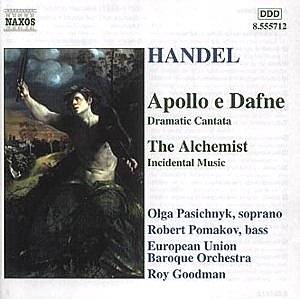 |
Georg Friedrich HAENDEL
(1685-1759) |
Apollo e Dafne is a dramatic cantata, scored for soprano, bass and orchestra. Like all such cantatas, written early in Haendel's career (between 1707 and 1710), these are simple works with an alternation of arias and recitatives, following an overture. (The original overture to this work has not survived, and the overture from his Concerto Grossi op. 3 no. 1 is played here, since it was probably composed around the same time.)
The plot is, as the liner notes justly point out, "a mythological storm in a teacup". The god Apollo, feeling rather satisfied at his handiwork spies the beautiful Dafne and is immediately smitten. He charms and seduces her, to no avail, as she is only able to resist by turning herself into a laurel tree. A strange fate indeed, but this is Greek mythology.
Bass Robert Pomakov has a very deep tone, which can sound somewhat muddy at times, hiding the words he is singing. He is certainly capable of the sometimes-demanding score, but I find his singing to be a bit unfitting for the tone of the music. Perhaps his diction is insufficient, or perhaps it is the aggressive tone of his arias? In any case, his voice seems to sing music but not words. (The liner notes say that he is only 19; this could be a simple lack of experience.) His final aria Cara pianta, co'miei pianti is sung much better; perhaps because he forces his voice less, this song being more restrained.
Soprano Olga Pasichnyk, on the other hand, has a very pure tone, and shows it well in the aria Felicissima quest'alma, a slow, plaintive song, which, at over 5 minutes long, is one of the most developed parts of this work. Another fine aria she sings is Come in ciel benigna stella, which recalls some of Bach's sacred arias, with oboes accompanying her crystalline voice.
The music here from Ben Jonson's play, The Alchemist, all (except one anonymous movement) comes from Haendel's opera Rodrigo. This was basically piracy; this unknown arranger took instrumental movements from the extended overture to this opera and reworked them as incidental music. Little did the pirate know that Haendel would soon come to England, although he was never identified as the composer of this music.
This music bears all the signature melodies of Haendel' instrumental works. Basically a suite for orchestra, in nine movements, this is at times solemn, as in the Saraband, at times lively, as in the Bourée and Gavotte. Delightful music, this must have been a fine accompaniment for Jonson's great play. Perhaps it helped get the English used to Haendel's style before he reached the country, and contributed to his success? We will never know.
Musically, this is a good disc; the two works fit well together. But the voice of bass Robert Pomakov is disappointing, in Apollo e Dafne, although soprano Olga Pasichnyk is excellent. A worthwhile recording, though not excellent. But, as always with Naxos discs, the price is right if you want to discover this music.
Kirk McElhearn